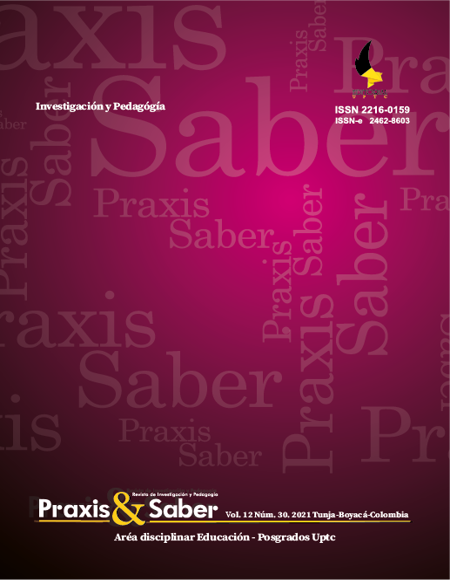Collaborative work as a didactic strategy for text production

Abstract
The article aims to analyze the perceptions of Spanish language teachers on the importance of implementing collaborative work as a didactic strategy for text production. A sequence was designed to address writing from a collaborative approach and to reflect on the role of teachers and students in this process. There were 22 participating teachers from educational institutions in the province of Concepción, Chile. The methodology used had a mixed design, with a descriptive approach. An observation guideline, a closed-ended questionnaire, and a script for the focus group were used as instruments. In the findings, on one hand, we highlight the value of collaborative work as a strategy that promotes the active role of students and fosters their cognitive and metacognitive development, as it allows them to approach knowledge from practice and, on the other hand, the active participation
in the learning process. Even though the strategy for student education is praised, there is a strong criticism regarding the process of written production and the way of working on collective construction with the students.
Keywords
writing, didactic strategy, metacognition, collaborative methodology
References
Apaydin, M., & Hossary, M. (2017). Achieving metacognition through cognitive strategy instruction. International Journal of Educational Management, 31(6), 696-717.
https://doi.org/10.1108/IJEM-05-2016-0130
Ávalos, B. (2016). El trabajo colaborativo docente puede ser potente para el aprendizaje y
desarrollo profesional [Seminario]. Mejorando las prácticas docentes en Matemáticas y Ciencias. Sala Zócalo - Centro de Investigación Avanzada en Educación de la Universidad de Chile (CIAE), Santiago, Chile.
Bañales, G., Ahumada, S., Martínez, R., Martínez, M., & Messina, P. (2018). Investigaciones
de la escritura en la educación básica en Chile: revisión de una década (2007-2016).
RLA. Revista de lingüística teórica y aplicada, 56(1), 59-84.
https://dx.doi.org/10.4067/S0718-48832018000100059
Bisquerra, R. (2009). Metodología de la investigación educativa. La Muralla.
Carr, A., Gilmore, G., & Cacciattolo, M. (2015). Case writing for collaborative practice in education studies. Qualitative Research Journal, 15(2), 121-134.
https://doi.org/10.1108/QRJ-01-2015-0005
Cisternas-León, T. (2016). Profesores principiantes de educación básica: dificultades de la
enseñanza en contextos escolares diversos. Estudios Pedagógicos, 42(4), 31-48.
https://dx.doi.org/10.4067/S0718-07052016000500003
Downing, K., Ning, F., & Shin, K. (2011). Impact of problem‐based learning on student experience and metacognitive development. Multicultural Education & Technology Journal, 5(1), 55-69. https://doi.org/10.1108/17504971111121928
Estrada, M., Monferrer, D., & Moliner, M. (2016). El aprendizaje cooperativo y las habilidades socio-emocionales: una experiencia docente en la asignatura técnicas de ventas. Formación Universitaria, 9(6), 43-62. https://dx.doi.org/10.4067/S0718-50062016000600005
Ferrari, L., & Bassa, L. (2017). Escritura colaborativa y actividad metalingüística. Traslaciones,
4(8), 121-142. http://revistas.uncu.edu.ar/ojs/index.php/traslaciones/article/view/1065
García, S., & Martínez, C. (2014). La importancia de las habilidades cognitivo-lingüísticas
asociadas al estudio de la astronomía desde la perspectiva del profesorado. Enseñanza
de las Ciencias, 32(1), 179-197. https://www.raco.cat/index.php/Ensenanza/article/view/
v32-n1-garcia-barros-martinez-losada
García-Medina, R., & García-Fernández, J. (2015). Cooperar para enseñar, aprender cooperativamente. REIRE: Revista D’innovació i Recerca en Educació, 8(2), 230-241.
https://doi.org/10.1344/reire2015.8.28217
Gibbs, G. (2012). El análisis de datos cualitativos en investigación cualitativa. Morata.
Hernández, I., Recalde, J., & Luna, J. (2015). Estrategia didáctica: una competencia docente
en la formación para el mundo laboral. Revista Latinoamericana de Estudios Educativos,
11(1), 73-94. https://www.redalyc.org/articulo.oa?id=134144226005
Hernández, R., & Infante, M. (2016). El método de enseñanza-aprendizaje de trabajo
independiente en la clase encuentro: recomendaciones didácticas. Revista de Pedagogía,
37(101), 215-231. https://www.redalyc.org/pdf/659/65950543011.pdf
Hernández-Carrera, R. (2014). La investigación cualitativa a través de entrevistas: su
análisis mediante la teoría fundamentada. Cuestiones Pedagógicas, 23, 187-210.
http://dx.doi.org/10.12795/CP
Imbernón, F. (2019). La formación del profesorado de educación secundaria: la eterna
pesadilla. Profesorado, 23(3), 151-163. https://doi.org/10.30827/profesorado.v23i3.9302
Kotuła, K. (2016). Une première expérience d’écriture collaborative – Enjeux et défis de
co-création des textes selon la perspective des membres d’un groupe nouvellement
constitué. Alsic, 19(2). https://doi.org/10.4000/alsic.2957
Lara, P., & Pulido, Ó. (2020). Escritura como práctica de sí y escuela rural. Praxis & Saber,
11(25), 21-45. https://doi.org/10.19053/22160159.v11.n25.2020.10480
Lomba, L., & Pino-Juste, M. (2017). Dificultades de los docentes en procesos de cambio y mejora en escuelas. Revista de Estudios e Investigación en Psicología y Educación,
Extraordinario, (5), 132-137. https://doi.org/10.17979/reipe.2017.0.05.2457
Martínez de Ojeda, D., & Méndez, A. (2017). El modelo TRIAL Classroom: percepción del
profesorado sobre su potencial desarrollo de las competencias del alumnado. Pulso, 40,
191-209.
Ministerio de Educación de Chile. (2013). Orientaciones técnicas para programas de
integración escolar. Mineduc.
Nordentoft, H., & Wistoft, K. (2012). Collaborative learning and competence
development in school health nursing. Health Education, 112(5), 448-464.
https://doi.org/10.1108/09654281211253452
Otzen, T., & Manterola, C. (2017). Técnicas de muestreo sobre una población a estudio.
International Journal of Morphology, 35(1), 227-232.
http://dx.doi.org/10.4067/S0717-95022017000100037
Perlado, I., Muñoz, Y., & Torrego, J. (2019). Implicaciones de la formación del profesorado
en aprendizaje cooperativo para la educación inclusiva. Profesorado, 23(4), 128-151.
https://doi.org/10.30827/profesorado.v23i4.9468
Pimienta, J. (2012). Las competencias en la docencia universitaria. Preguntas frecuentes.
Pearson.
Schettini, P., & Cortazzo, I. (2016). Técnicas y estrategias en la investigación cualitativa. Edulp.
http://sedici.unlp.edu.ar/bitstream/handle/10915/53686/Documento_completo__.
pdf?sequence=1#page=18
Tanner, K. (2012). Promoting student metacognition. CBE-Life Sciences Education, 11(2),
113-120. https://doi.org/10.1187/cbe.12-03-0033
